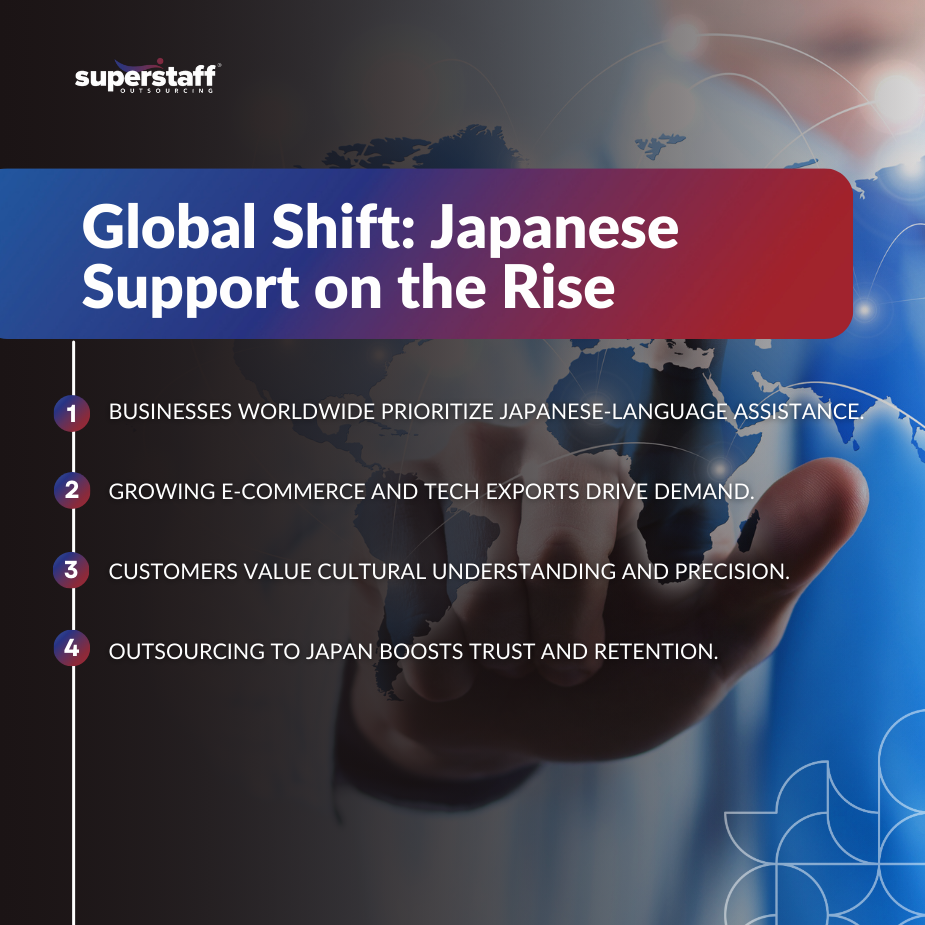
Businesses serving international customers are paying closer attention to the Japanese market. Known for high standards of service and detail-oriented expectations, Japanese consumers and clients often judge brands by the quality of support they provide. This has led to a sharp rise in the demand for Japanese customer support.
Companies that want to grow internationally are seeking cost-effective, reliable, and culturally aligned ways to deliver these services. Outsourcing providers have stepped in to fill this need, making Japanese customer support a key part of multilingual customer service strategies worldwide.

Why Japanese Customer Support is Expanding Globally
Japanese-speaking customers represent one of the most influential groups in global commerce. Businesses that want to succeed in this market need more than simple translations; they need professional services designed for cultural expectations.
1. Growth of Japanese Consumers Abroad
E-commerce platforms and travel businesses are serving more Japanese buyers outside Japan. Japanese customer support ensures these customers receive clear, accurate, and respectful service.
2. Global Firms Entering Japan
International companies expanding into Japan cannot compete effectively without reliable customer support in Japanese. BPO providers help bridge this gap.
3. Strong Demand for High-Quality Service
Japanese consumers value fast, polite, and precise responses. Japanese customer support outsourcing for global brands has become essential for meeting these expectations.
4. Expanding Tourism and Travel
With millions of Japanese tourists traveling each year, industries such as hospitality and airlines rely on Japanese customer support services to build trust.
5. Digital Products and Subscriptions
Gaming, software, and streaming platforms must support Japanese users. Reliable support in their native language keeps customer satisfaction high.
Challenges Businesses Face Without Outsourcing
While many businesses want to offer Japanese customer support in-house, it is not always easy or cost-effective.
1. Limited Skilled Staff
Hiring fluent Japanese speakers locally is challenging in many countries, making it difficult to form a full team internally.
2. High Labor Costs
Building an in-house team requires salaries, training, and benefits that may not be sustainable for SMEs.
3. Cultural Alignment Barriers
Even when businesses hire Japanese-speaking staff, service quality often depends on cultural training. Outsourcing partners already specialize in this area.
4. Difficulty Maintaining 24/7 Service
Global markets require around-the-clock service, but smaller in-house teams cannot always cover all time zones.
5. Specialized Training Requirements
Industries such as finance, healthcare, or IT require more than just language fluency. Staff need technical training, which outsourcing firms are equipped to provide.
How Outsourcing Firms Deliver Japanese Customer Support
Outsourcing has become the most reliable way for companies to provide high-quality Japanese support without the burden of building in-house teams.
1. Recruiting Skilled Japanese Agents
BPO firms maintain pools of fluent Japanese professionals with the right mix of language skills and customer service experience.
2. Multilingual Customer Service Centers
Many outsourcing hubs operate multilingual customer service departments, where Japanese is one of several language offerings for global clients.
3. Scalable Solutions
Japanese customer support can expand during peak seasons, such as holiday shopping or travel surges, and scale down when demand slows.
4. Blending Cultural and Technical Knowledge
Outsourced agents are trained in both cultural etiquette and product knowledge, ensuring a complete service experience.
5. Reliable Infrastructure
Global BPO providers offer the technology, call center systems, and secure data management needed to maintain service quality.
Benefits of Outsourcing Japanese Customer Support
The value of outsourcing goes beyond affordability. Businesses gain a range of strategic advantages by working with specialized providers.
1. Cost Savings
Outsourcing helps reduce labor, training, and infrastructure expenses while still providing high-quality Japanese customer support services.
2. Improved Customer Satisfaction
Professional agents handle inquiries with accuracy and cultural sensitivity, leading to better customer experiences.
3. Flexibility for SMEs and Enterprises
Both startups and large companies can access Japanese support tailored to their scale and budget.
4. Global Coverage
Outsourcing centers allow companies to provide support across multiple time zones, keeping service consistent.
5. Stronger Brand Reputation
Meeting the expectations of Japanese customers builds credibility and trust, giving businesses an advantage in international markets.
Industries Relying on Japanese Customer Support
Several sectors now depend heavily on Japanese support to meet customer needs and stay competitive.
- E-commerce: Platforms rely on Japanese support to handle inquiries, returns, and product questions.
- Technology: Software and IT providers offer help desk and troubleshooting in Japanese.
- Travel and Hospitality: Airlines, hotels, and booking sites manage reservations and guest relations in Japanese.
- Finance: Banks and fintech companies use Japanese customer support to manage client accounts and inquiries.
- Entertainment: Gaming and streaming services keep Japanese users engaged through localized support.
Regional Outsourcing Options for Japanese Language Support
Businesses can choose from multiple outsourcing destinations, depending on budget, scale, and service needs.
1. Philippines
Known for its strong BPO sector, the Philippines provides cost-efficient Japanese customer support while maintaining service quality.
2. Malaysia
Malaysia is home to multilingual outsourcing hubs with a talent pool of Japanese speakers.
3. Latin America
Some Latin American centers offer Japanese-speaking staff, making them useful for nearshore support to the U.S. market.
4. India
India provides scalability and cost efficiency for large-volume Japanese customer support projects.
5. Hybrid Models
Businesses often combine multiple regions to balance cost, service coverage, and talent availability.
Long-Term Impact on Global Business Growth
Outsourcing Japanese customer support is not just about solving immediate service gaps. It also contributes to a company’s global expansion.
1. Stronger Market Entry in Japan
Reliable support builds trust with Japanese consumers when brands first expand into the country.
2. Improved Retention of Japanese Customers
High-quality service encourages loyalty, repeat purchases, and positive word of mouth.
3. Efficient Resource Allocation
Outsourcing allows businesses to focus on product development and strategy while experts handle support.
4. Competitive Positioning
Companies offering Japanese support gain an edge over competitors who lack multilingual coverage.
5. Sustainable Operations
Outsourcing ensures businesses can maintain consistent service without unpredictable staffing costs.
Expanding Global Reach with Japanese Language Services
Japanese customer support is becoming an essential part of global business strategies. Companies that want to compete internationally cannot ignore the value of serving Japanese customers effectively. By working with outsourcing providers, businesses ensure both service quality and long-term growth.
SuperStaff helps businesses deliver professional Japanese customer support while keeping operations cost-effective. With expertise in multilingual customer service, the company ensures that SMEs and large enterprises alike can serve Japanese customers with accuracy and respect.
Choosing outsourcing partners with proven experience makes Japanese customer support outsourcing for global brands a practical and sustainable solution. SuperStaff is ready to help businesses expand their global reach and achieve long-term customer satisfaction.
Companies that outsource to reliable providers can scale quickly and maintain service quality. SuperStaff stands out by offering flexible, affordable, and future-ready Japanese customer support services tailored for global growth.






